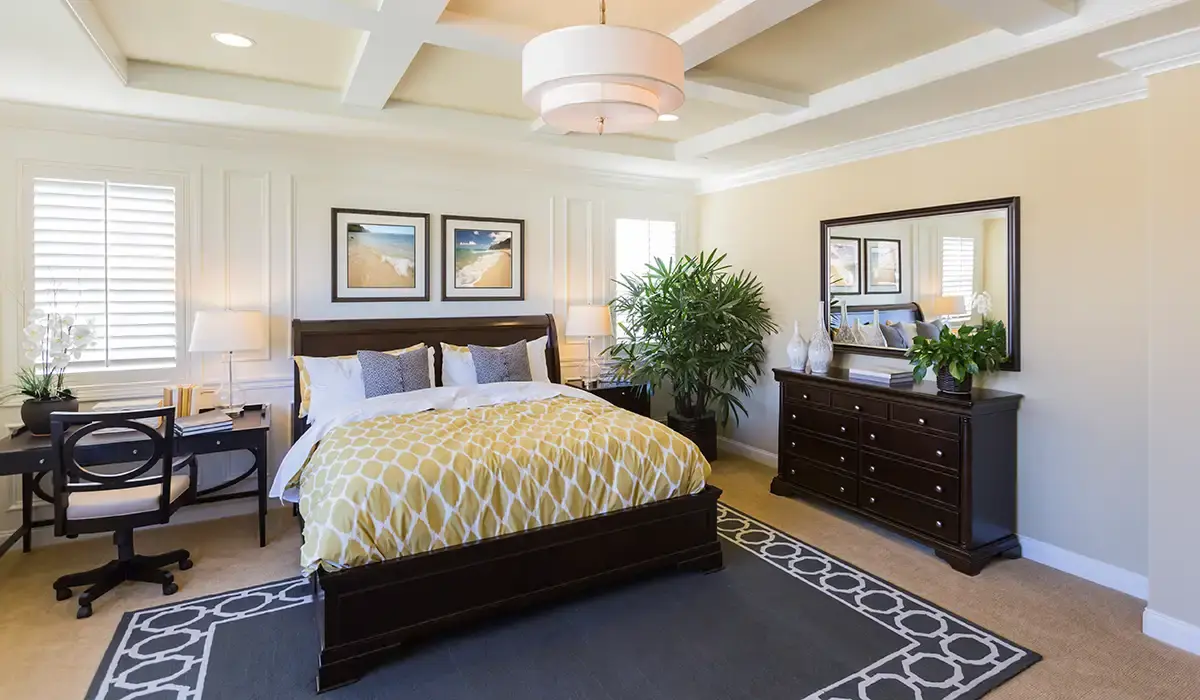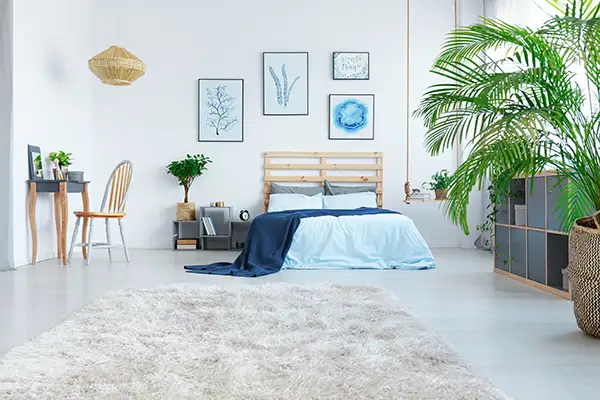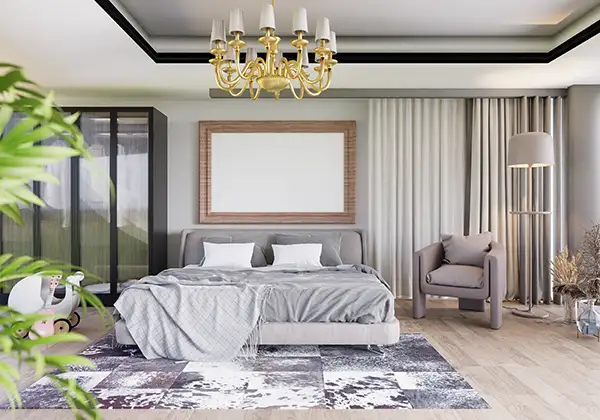Bedroom
How to Choose and Position the Right Area Rug for Your Bedroom

Bedroom Rug Positioning Guide: Expert Tips for Perfect Rug Placement in Every Space
Adding a rug enhances comfort and style, but placement matters most. This bedroom rug positioning guide will help you choose wisely.
The right rug placement transforms a basic bedroom into a designer-level retreat that feels both intentional and visually appealing. In this bedroom rug positioning guide, you’ll learn how to choose the best rug size and layout to complement your room’s style and furniture placement perfectly.
Why Rug Placement Matters in the Bedroom
Rugs define spaces and create softness underfoot. However, choosing the wrong size or placement can disrupt your room’s flow and balance.
When done right, rug placement adds depth, visual interest, and functionality. Transitioning between rug sizes depends on the layout, bed size, and surrounding furniture.
Before you shop, measure your space carefully. Then, follow this bedroom rug positioning guide to avoid common mistakes and maximize your rug’s impact.

How to Choose the Right Rug Size for Your Bed
Let’s begin by matching your rug to your bed size. Proportion plays a critical role in creating a balanced and luxurious atmosphere.
Best Rug Sizes for King Beds
A king-sized bed requires a large rug to anchor it visually. Consider the following standard rug sizes:
- 8 x 10 feet
- 9 x 12 feet
- 12 x 15 feet
Use at least an 8-by-10 rug, but size up for drama and complete side coverage.
Best Rug Sizes for Queen Beds
Queen beds benefit from slightly smaller rugs, though the same general guidelines apply for comfortable and symmetrical layouts.
Recommended sizes:
- 6 x 9 feet
- 8 x 10 feet
Designers suggest showing at least 18 inches of rug on either side of your bed for best visual and practical results.
How to Place an Area Rug Under the Bed
The most common rug layout starts beneath your bed and extends toward the sides and foot for a cozy appearance.
Option 1: Full Coverage With Nightstands
Place the rug underneath the entire bed, including nightstands. This provides a symmetrical, grounded look and adds extra softness around the bed.
Option 2: Partial Placement Without Nightstands
Stop the rug just before the nightstands. This layering technique allows the rug to highlight the bed without hiding too much beneath furniture.
Run the rug perpendicular to the bed frame so it balances proportion and creates softness where your feet land every morning.
Using Runners or Small Rugs Beside the Bed
If you don’t want to place one large rug under your bed, consider flanking the bed with runners or smaller rugs instead.
Place one rug on each side for symmetrical warmth. This method adds beauty without wasting coverage under the mattress.
Custom runners offer a tailored appearance. Choose styles that complement your bedroom’s design while fitting neatly from headboard to footboard.

Placing a Rug Around Other Bedroom Furniture
Rugs aren’t just for beds—they enhance furniture groupings too. Use rugs to define areas like seating corners or under dressers.
Place a rug partially under a dresser to frame the furniture. Avoid using a rug that’s too small or stops awkwardly beneath large pieces.
Let the rug flow at least halfway under the dresser or fully beyond the furniture to avoid it appearing misplaced or undersized.
Helpful Rug Placement Tips for Bedroom Design
These tips from designers can improve your layout and ensure your rug selection contributes to a warm, polished bedroom.
Choose a Soft, High-Pile Rug for Bare Feet
Your feet will love a high-pile rug. Materials like wool or cotton offer softness and durability—ideal for comfort-first bedroom styling.
Cover High-Traffic Zones Near the Bed
Position rugs where you walk most, such as beside the bed or in front of your dresser, to protect flooring and add warmth.
Avoid Rugs That Are Too Small
Rugs that don’t extend far enough from under your bed look awkward and offer limited foot coverage. Always size up when uncertain.
Creative Ideas to Style Your Bedroom Rug
Make your rug a focal point by incorporating texture, color, or even creative layouts to reflect your personal design tastes.
Add Bold Patterns or Colors
A statement rug instantly transforms a minimalist room. Experiment with color or shape to inject personality without committing to new furniture.
Place Area Rugs Over Carpeting
Rugs can absolutely go over carpet. Add one for extra warmth, to create contrast, or to define specific areas of a carpeted room.
Layer Multiple Rugs for Texture and Depth
Layer rugs for dimension and flair. Start with a neutral base rug and layer a smaller colorful rug diagonally for dramatic effect.
Layering also helps define spaces within large bedrooms or open-concept layouts while adding luxurious texture and color variation.
Rug Styling Ideas for Small Bedrooms
Even in compact rooms, strategic rug placement can enhance both comfort and the illusion of space with just a few simple adjustments.
Opt for a small 5-by-7 rug placed under two-thirds of the bed. Let the rug peek out beyond the foot and sides slightly.
Runners also work well in narrow layouts. They give softness on each side of the bed while keeping the floor mostly visible for flow.
Use light colors and minimalist designs to maintain a sense of openness without overwhelming the bedroom’s square footage.
Final Thoughts: Master Rug Placement With This Bedroom Rug Positioning Guide
With the right strategy, you can transform your entire room using nothing but a well-placed, well-sized rug. Let this bedroom rug positioning guide lead the way.
Always measure your room and bed. Then decide between under-bed placement, flanking runners, or layered arrangements to suit your unique needs.
Whether you love high-pile rugs or patterned runners, remember: function meets style when you follow this bedroom rug positioning guide carefully.
Looking for more home design inspiration and space-saving decor tips? Explore more expert guides and home updates right here on this website.
